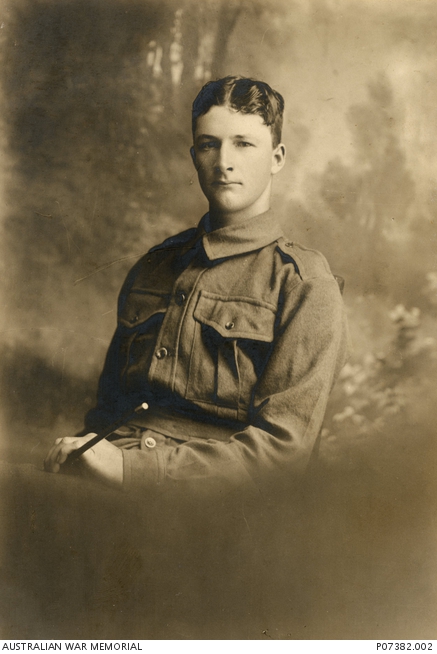Pte
Bertie Clarence 'Bluey' Bartlett
Information about birth
|
Year of birth: 1893 |
|
Place of birth: Parkes, New South Wales, Australia |
General information
|
Last known residence: Deep Lead, Parkes, New South Wales, Australia |
|
Profession: Labourer |
|
Religion: Church of England |
Army information
|
Country: Australia |
|
Force: Australian Imperial Force |
|
Rank: Private |
|
Service number: 4977 |
|
Enlistment date: 17/01/1916 |
|
Enlistment place: Parkes, New South Wales, Australia |
|
Units: — Australian Infantry, 17th Bn. (New South Wales) (Last known unit) |
Information about death
|
Date of death: 09/10/1917 |
|
Place of death: Decline Copse, Passchendaele, Belgium |
|
Cause of death: Killed in action (K.I.A.) |
|
Age: 24 |
Cemetery
|
Tyne Cot Cemetery Plot: XL Row: D Grave: 23 |
Distinctions and medals 2
|
British War Medal Medal |
|
Victory Medal Medal |
Points of interest 4
| #1 | Place of birth | ||
| #2 | Last known residence | ||
| #3 | Enlistment place | ||
| #4 | Place of death (approximate) |
My story
Bertie Clarence Bartlett, a former labourer, was born in Parkes, New South Wales, Australia, as the son of Mr. and Mrs. Owen Bartlett. On 17 January 1917, he enlisted in Parkes and served as a Private in the 17th Battalion, together with his brother Owen. This battalion was part of the 5th Australian Infantry Brigade, within the 2nd Australian Division.
On 9 October 1917, the 5th Brigade took part in the Battle of Poelcappelle. They were positioned between Tyne Cot and Daisy Wood, with the 66th Division on their left. Their objective was to protect this flank and to push the frontline eastwards towards Decline Copse and Rhine Copse. The offensive started at 5:20 a.m. and began successfully. By 9 a.m., the 5th Brigade had already secured the first objective near Defy Crossing. The 17th Battalion even held Decline Copse for three quarters of an hour, but the division had become isolated as both flanks fell behind. This made them vulnerable to encirclement. The 6th Division on their right had failed to take Daisy Wood and decided to follow their path instead. The British 66th Division on the left was only encountered again after a retreat to the line near Defy Crossing. That retreat caused heavy casualties in the 5th Brigade. They remained in position for the rest of the day.
Clarence, aged 24, was shot in the head by a sniper near Decline Copse, killing him instantly. His body remained in a shell hole and could not be recovered that day due to the retreat. His brother Owen also died shortly after, having been wounded in the same battle and succumbing to his injuries six days later. Private Bertie Clarence Bartlett is buried at Tyne Cot Cemetery, Plot XL, Row D, Grave 23.
On 9 October 1917, the 5th Brigade took part in the Battle of Poelcappelle. They were positioned between Tyne Cot and Daisy Wood, with the 66th Division on their left. Their objective was to protect this flank and to push the frontline eastwards towards Decline Copse and Rhine Copse. The offensive started at 5:20 a.m. and began successfully. By 9 a.m., the 5th Brigade had already secured the first objective near Defy Crossing. The 17th Battalion even held Decline Copse for three quarters of an hour, but the division had become isolated as both flanks fell behind. This made them vulnerable to encirclement. The 6th Division on their right had failed to take Daisy Wood and decided to follow their path instead. The British 66th Division on the left was only encountered again after a retreat to the line near Defy Crossing. That retreat caused heavy casualties in the 5th Brigade. They remained in position for the rest of the day.
Clarence, aged 24, was shot in the head by a sniper near Decline Copse, killing him instantly. His body remained in a shell hole and could not be recovered that day due to the retreat. His brother Owen also died shortly after, having been wounded in the same battle and succumbing to his injuries six days later. Private Bertie Clarence Bartlett is buried at Tyne Cot Cemetery, Plot XL, Row D, Grave 23.
Connection to other soldiers 1
|
Owyn John Thomas Bartlett
Brother |
Sources 8
|
"N.S.W. CASUALTIES." (Sydney, The Daily Telegraph, 01/12/1917). https://trove.nla.gov.au Sources used |
|
"NEW SOUTH WALES." (Sydney, The Sydney Morning Herald, 01/12/1917). https://trove.nla.gov.au Sources used |
|
"PERSONAL." (Forbes, The Forbes Advocate, 27/02/1917). https://trove.nla.gov.au Sources used |
|
Australian Red Cross Wounded and Missing Enquiry Bureau (Australian War Memorial, Campbell (AWM), RCDIG1064166). https://www.awm.gov.au Sources used |
|
AWM4 Class 23 – Infantry (Australian War Memorial, Campbell (AWM), AWM4 23). https://www.awm.gov.au Sources used |
|
First Australian Imperial Force Personnel Dossiers, 1914-1920, (National Archives of Australia, Canberra (NAA), B2455, BARTLETT B C). https://recordsearch.naa.gov.au Sources used |
|
McCarthy, Chris. Passchendaele: The Day by Day Account (Londen: Arms & Armour Press, 2018), 119-121. Sources used |
|
Unit embarkation nominal rolls, 1914-18 War (Australian War Memorial, Campbell (AWM), AWM8). https://www.awm.gov.au Sources used |
More information 4
|
Commonwealth War Graves Commission Database https://www.cwgc.org/find-records/find-war-dead/casualty-details/461855 |
|
Namenlijst (In Flanders Fields Museum) https://namenlijst.org/publicsearch/#/person/_id=34990f16-f3d7-4c19-b21d-4a8f5750006c |
|
Lives of the First World War (Imperial War Museum) https://livesofthefirstworldwar.iwm.org.uk/lifestory/7352001 |
|
The AIF Project (UNSW Canberra) https://aif.adfa.edu.au/showPerson?pid=15272 |
